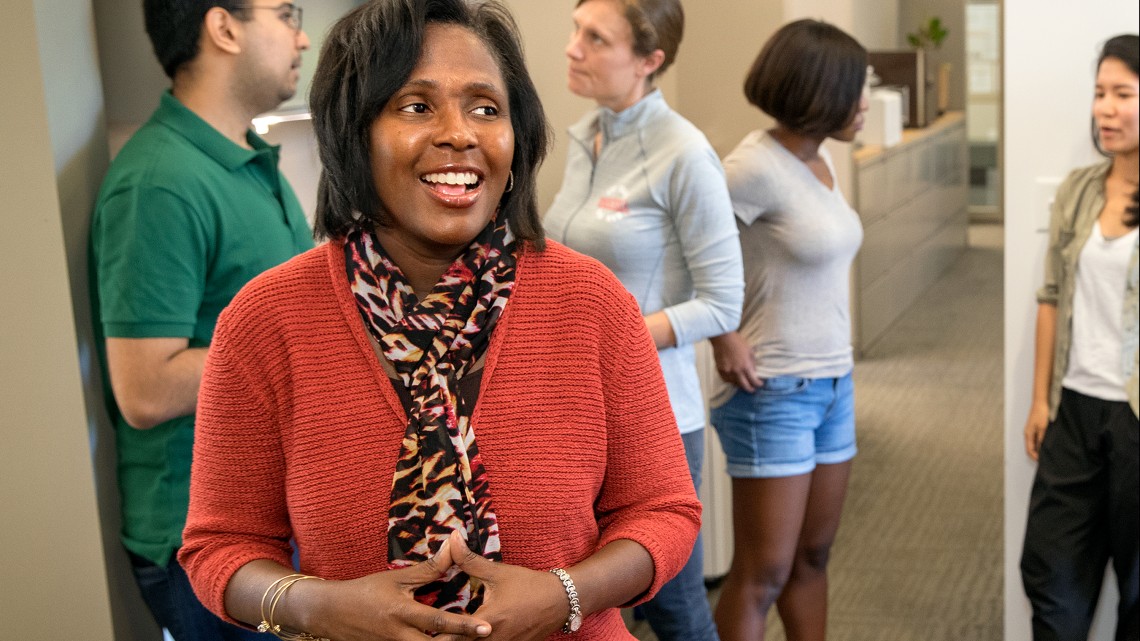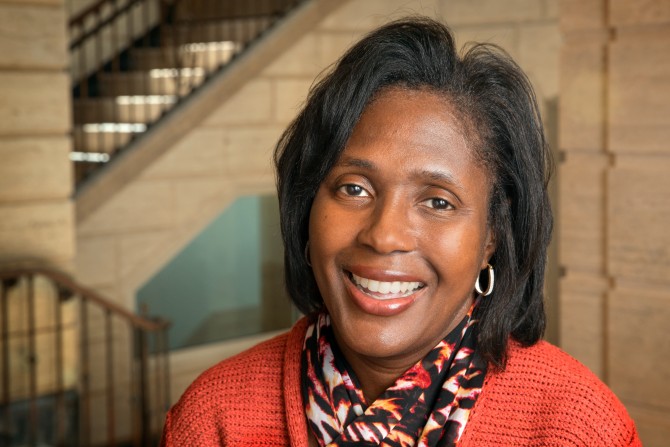
Lynn Wooten, the David J. Nolan Dean and a professor of management and organizations in the Charles H. Dyson School of Applied Economics and Management.
Meet Lynn Wooten, new dean of the Dyson School
Lynn Wooten joined Cornell July 1 as the David J. Nolan Dean and a professor of management and organizations in the Charles H. Dyson School of Applied Economics and Management. She recently sat down with Cortney Kay, associate director of marketing and communications at Dyson, to discuss her new role, her sense of connection to Cornell’s mission and her strategic vision for the school.
You’re joining us from the University of Michigan’s Ross School of Business. What attracted you to Cornell?
I felt drawn to the mission of the university, the array of programs offered to students and the diversity of programs that interest all students. Ezra Cornell’s vision of “any person ... any study” has long resonated with me. The ability to work closely with Cornell’s undergraduate student population was very attractive as well. As a popular major and minor, undergraduate business touches so many lives, regardless of the industry, and the ability to serve so many students through our various programs is exciting. Additionally, the Dyson School is known for its outreach, and I have tried to bridge research and practice throughout my career.
What do you want Cornell’s faculty, staff and students to know about you?
I love college life! I always tell people I went to college as an undergraduate student 30 years ago and never left. I am energized about learning and sharing learning with others.
Tell us a little about your leadership style.
At the heart of my leadership style - beyond learning - is community-building and involvement. I enjoy working with students and teams, and I want to be involved at Cornell not only at the Dyson level, but with various campuswide organizations as well. My leadership style is very community-centered, service-oriented and collaborative.
In your previous roles, you had a great deal of direct interaction with students and provided support and counsel to student organizations. Why is it important to you to connect and engage directly with students?
For me, it’s all about connections. It’s about maintaining my open-door policy, attending events, sitting in the classroom, bringing students and alumni together so they can connect, going to campus sporting events, facilitating workshops and more. In my previous role I conducted leadership courses for sororities and fraternities, met with various student groups and even traveled with them to student-focused events, when possible.
What opportunities are you focused on during your first year at the Dyson School?
I love to meet new people and learn about their backgrounds, their goals and what drives them, so I’m looking forward to meeting and learning about what our students, faculty and staff want to gain from their Dyson experience. I will be spending time getting to know our alumni and other members of the Dyson community as well. I also want to ensure that we do everything we can to prepare our students to make a positive impact once they leave our campus. In addition, I will be looking at how Dyson can continue to contribute not only to the mission and strategic goals of the Cornell SC Johnson College of Business, but also to the university.
How is Dyson different from other undergraduate business programs?
In addition to our close-knit community, we aim to provide students with an education that sets them on the path to making the world a better place. The curriculum offers a wide range of courses that balance business economics with a liberal arts foundation. Furthermore, there are so many opportunities for students to take diverse courses outside of their major.
The Dyson School is also unique in that it is shared between two colleges - the College of Agriculture and Life Sciences and the Cornell SC Johnson College of Business. Our rich history with CALS combined with our future as part of Cornell SC Johnson means our students have opportunities for diverse curricular and learning and engagement beyond the classroom setting. This positions Dyson to be cutting edge with the movement that I have been working toward with the Aspen Institute, which is for business education to integrate the arts and sciences for inquiry, analytical and reflective learning. For example at Dyson, we bring such topics to the classroom as sustainability, food deserts and poverty, and find ways to use business to solve real-world problems.
What is your strategic vision for the Dyson School?
I want to ensure that we are attracting the best faculty, staff and students and that we are working together, in the classroom, in the community and through research, to live the Dyson ethos of “Our business is a better world.” We need to incorporate our mission into the classroom experience and ensure that the faculty have the resources they need for their research. From a strategic standpoint, we are also looking at how we work with stakeholders throughout the world and serve the people of New York.
How does Dyson contribute to the future direction of the Cornell SC Johnson College of Business?
In partnership with the School of Hotel Administration and the Samuel Curtis Johnson Graduate School of Management, I envision Dyson being a hub and a spoke for educational programs, such as undergraduate business minors and majors, specialty master’s programs and doctoral studies, as well as a community within which Cornellians can convene for dialogue, learning and co-creating knowledge relating to the intersection of business and societal issues. This might entail a speaker’s series, leadership development seminars, research conferences, extension programming and engaged learning.
Your son graduated last May from the School of Hotel Administration as part of the inaugural class of the Cornell SC Johnson College of Business. What unique perspective do you bring to your role as the parent of a recent graduate?
I understand Cornell - the academics, the culture, the profile of the students. Being a parent of a student gives you a unique perspective in that you see both sides of the coin - both as a consumer of the Cornell experience and now as a provider of the experience in my new role as dean.
What do you do outside of work?
I especially love spending time with my family. I also enjoy reading historical fiction and suspense novels, and cooking, when I have time. When I don’t have time to cook, my family and I try new restaurants. We’re looking forward to experiencing the food scene in Ithaca!
What’s the best advice you ever received?
Get up every day and think about how you can be your best self. Consider how you can make a contribution in the lives of others, how you can make a difference in the world, and always be grateful for what you have. This advice was first instilled in me by my mother, and I continue to live by these words.
Media Contact
Get Cornell news delivered right to your inbox.
Subscribe